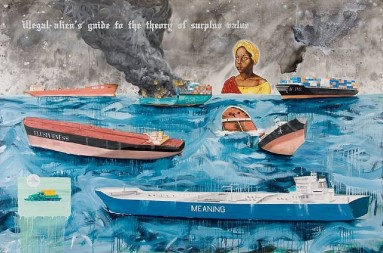Five Questions with __________ is an experiment with flash interviews. The series on poets continues with poet, literary scholar, and short story writer Harryette Mullen. While Mullen may be associated with a Modernist pull, I prefer to think of her style as rich and captivating in contradictory sways. Profuse minimalism. Lean baroque. Sleeping With the Dictionary first drew me to her work—due to a growing (and unabated) obsession with abecedarian books—to be followed by Tree Tall Woman, Trimmings, S*PeRM**K*T, Muse & Drudge, and the critical volume The Cracks Between What We Are And What We Are Supposed To Be.
In the latter she penned the essay “Evaluation of an Unwritten Poem” (after a Wis?awa Szymborska poem) considering the “mutual incomprehension” wrought by the post-Renaissance divorce of science, art, and humanities. She segues from a criticism of the “rift between poetic and prosaic discursive modes and the clashing styles of creative-intuitive and critical-analytical thinkers” to discussing her personal process shuttling between poet and critic. She writes unfussily and at length about how not to sabotage the “creative brainstorming required to explore ideas and make associations without knowing exactly where they will lead?.”
Her focus on an economy of creative roles reminded me of Walter Benjamin’s aphorism: “Stages of composition: idea — style — writing.” And like Benjamin, Mullen’s aphoristically charged and truncated poems in Trimmings could find a welcoming home on Twitter:
Menswear, the britches. Rosie flies off the handle. Jeans so tight, she pants. Wants to cool out, slacks off.
Or:
Desperately pregnant nubile preferred stock girls deliver perfect healthy psychic space alien test tube babes, in ten or less, or yours is free, we guarantee.
Urban Tumbleweeds (Graywolf, 2013) is her variation on the Japanese form tanka, a 31-syllabic poem (Mullen works with it as a “flexible three-line form with a variable number of syllables per line”). Composed over her long walks throughout Los Angeles, the book didn’t turn Mullen “into an amateur naturalist or avid birdwatcher” but someone who finds that “what we call natural or native is more than ever open to question.” That line brought to mind Trinh Minh-Ha’s line in The Digital Film Event that “there is no concept of ‘dead nature’ or nature morte in ancient Eastern Art. Nature is alive, always shifting.”
Mullen’s Americans, however, prefer packaged nature:
Even in this landscaped paradise
people buy fresh-cut flowers, considered
more aesthetic than the ones growing in the yard.
Can one train the personality—or at least curb the ferocity—of one's inner critic?
I like to start a poem just before falling asleep at night, or just after waking up, when the critic is not on duty.
What written works do you find yourself returning to again and again, and which will you never revisit?
I still have some of my high school and college textbooks, so I’m not sure I’d ever say never to a book, whether it's one I've read already or one I hope to read "someday."
Is art practice inherently synesthetic, ceaselessly interchanging one organ's sense and stimulation for another?
Doesn’t art follow perception and also shape perception?
Rabih Alameddine in Koolaids: The Art of War:
In America, I fit, but I do not belong.
In Lebanon, I belong, but I do not fit.
Where do you fit and not belong, or belong and not fit?
I belong to myself, but I try to fit where I can make myself useful.
What happens to the poets that history forgets?
If our attention is limited and if poets are valued according to the needs or preoccupations of each generation of readers, then cycles of memory and forgetfulness may be inevitable. As long as there are archives of forgotten works, we have opportunities for rediscovery.

